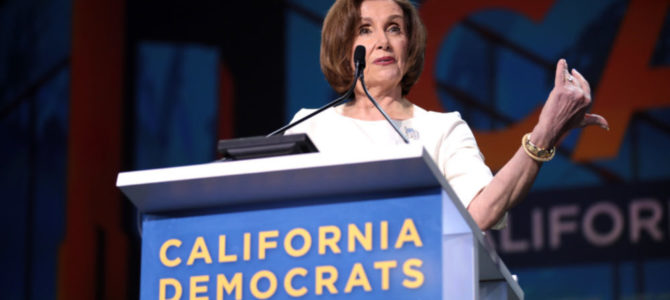
The weekend began with a bipartisan plan. People were hopeful. Outside of Washington, business owners told The Federalist they finally saw light in all the darkness. They thought they’d be able to hire their employees back again. These are employees who have families, mortgages, and lives; people who have never once asked for public assistance and never thought they’d have to.
The mood in Washington was optimistic as well. “We’re having good bipartisan agreements,” Senate Minority Leader Chuck Schumer told CNN Saturday, predicting a Monday passage of their plan. “The initial bill Leader [Mitch] McConnell put in didn’t have any Democratic input and we were worried that we just try to put it on the floor and not consult Speaker [Nancy] Pelosi because the House still has to pass this, but actually, to my delight and surprise, there has been a great deal of bipartisan cooperation thus far.”
On Sunday, Schumer met four times with Secretary of the Treasury Steven Mnuchin to continue negotiations.
And then Pelosi came back to town from her week-long vacation and announced the rare, rare bipartisan cooperation the country had seen in the Senate would end with her — and election politics would begin.
“Oh, I don’t know about Monday but we are still talking,” she said Sunday evening. “It’s on the Senate side now because that’s their deadline for a vote but we’ll be introducing our own bill and hopefully it’ll be compatible with that they discussed on the Senate.”
It was difficult to guess how she’d do this with the House in recess, but on Monday her office miraculously introduced a 1,400-page bill. Miraculous, until it became clear she’d simply unloaded the Democratic Party’s election platform into a bill intended to save Americans from bankruptcy and death in the face of a global pandemic.
The list of unrelated provisions is truly incredible. Pelosi’s emergency virus bill includes “collective bargaining… for federal workers,” a federal “study on climate mitigation efforts,” tax credits for wind and solar energy, and demands that the airlines involved buy carbon credits “to fully offset [their] annual carbon emissions.” It includes “same day [voter] registration,” national early voting and “grants for conducting” election audits.
Pelosi’s emergency virus bill legislates “funding standards for community newspaper” retirement plans, cancels $10,000 off peoples’ college debts, and forces a $15 minimum wage and permanent paid leave on aid recipients. It awards more than $33 million to the National Oceanic and Atmospheric Administration “for necessary expenses to prevent, prepare for, and respond to coronavirus,” and $35 million to Washington’s Kennedy Center for the Performing Arts.
Pelosi’s emergency virus bill cancels the Post Office’s considerable debt to taxpayers and grants it “additional borrowing authority.” It gives Washington oversight of the “corporate board diversity” for the companies involved, mandates “a comparison of pay amongst racial and ethnic minorities… as compared to their white counterparts and comparison of pay between men and women,” orders the companies to start “diversity and inclusion offices” and give those offices “officials and budget dedicated to diversity,” and it establishes a program “to expand the use of minority banks and minority credit unions.”
This, it is clear, is not an emergency virus bill. It is a Democratic election wish list, politically poisoned at a time when hundreds are dying, thousands are losing their businesses, and millions are out of work in the United States.
“This,” House Majority Whip Jim Clyburn told Democrats Thursday, “is a tremendous opportunity to restructure things to fit our vision.”
It’s truly an incredible political act by the speaker, and the entire Democratic Senate fell in step behind her. By Monday afternoon, while Republican after Republican took the floor to speak on the bill, most Democrats were not even in the chamber.
“I thought we were doing great work,” Sen. Jim Inhofe lamented to a half-empty chamber. “Everything was great until last night.”
Everything had been great for Pelosi and the Democrats’ political fortunes as well. Early in the crisis, the speaker took a lead role, passing a Democratic wish list with the first round of emergency aid. Republicans in the House and Senate passed her bill despite its severe problems and near-complete lack of compromise.
McConnell was absent from early negotiations, providing zero cover while Mnuchin, a former Democrat with a bipartisan reputation as a terrible negotiator, surrendered on the president’s asks. The president himself fluctuated between defensive and tired, giving an Oval Office address that was so poorly received he rebooted his communication strategy. Today, McConnell and Republicans are at the forefront, the president’s handling of the crisis is popular across the country, and even Pelosi’s allies in the corporate media are struggling to explain her actions.
The New York Times changed their Sunday headline three times, starting correctly with “Democrats Block Action On $1.8 Trillion Stimulus,” then shifting the truth to “Democrats Block Action On Stimulus Plan, Seeking Worker Protections,” and finally editing the headline to pure farce with “Partisan Divide Threatens Deal On Rescue Bill.”
“Take us inside the politics here,” MSNBC’s Stephanie Ruhle asked after the speaker’s Monday speech quoting the pope to justify her actions. “How about this: What was the point of that?”
“Well,” correspondent Garrett Haake replied, “this is an opportunity for Democrats to show what their priorities are in this crisis.”
Indeed. And Americans are unlikely to be thrilled with those priorities while our economy careens toward devastation.
“Today, 102 Americans died while the Democrats blocked consideration of this bill,” Sen. Ted Cruz yelled from the floor of the Senate in a fiery response. “One Texan died while this chamber decided not to show up for work and do their job!”
“What the hell do the emissions standards on airplanes have to do with thousands of people dying and millions of people out of work in the coronavirus epidemic!?”
“What in the hell does a windmill have to do with this crisis, other than there are some Democratic lobbyists getting fat and rich and they’re willing to extort a crisis for a political agenda!?”
“One of the reasons the Democrats think they will get away with this,” Cruz closed, “is they expect the media to be utterly complict.” The corporate media is doing its best.
“For the moment,” Schumer had told CNN just 36 hours earlier, “we’re just trying to work together for the good of the country.”
The moment was brief, their miscalculation tremendous, and the political impact could — and should — be lasting.









